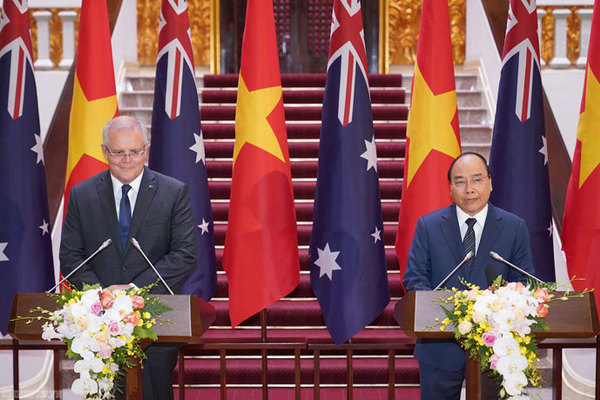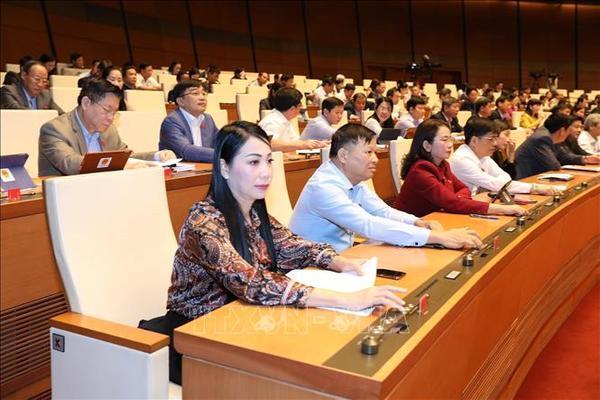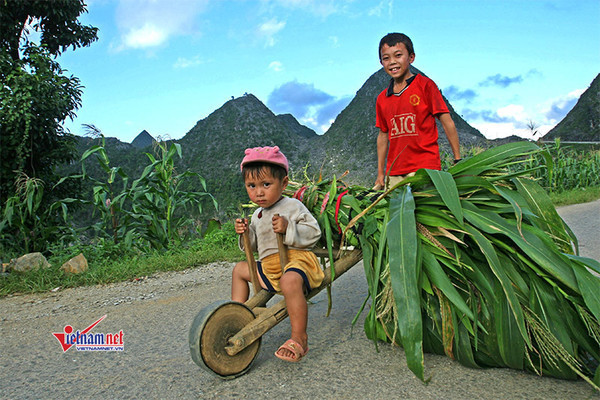 |
|
Prime Minister Nguyen Xuan Phuc and his Australian counterpart at a press conference. Photo: VGP/Quang Hieu
|
In the spirit of the close strategic partnership between the two countries, which has been further strengthened after the recent official visit to Vietnam by Australian Prime Minister Scott Morrison, the dialogue was conducted openly.
Australia and Vietnam presented an overview of the goals and strategies to ensure more effective human rights in the specific context of each country to bring better things to people and society as a whole.
According to information published in the World and Vietnam newspaper, at this dialogue round, the two countries discussed the approach to human rights, as well as their respective efforts and achievements since the Round of Advocacy in the protection and promotion of human rights, including economic, social and cultural rights, civil and political rights, labor rights, rights of vulnerable groups, and religious freedom, education, expression of opinion, association and assembly. Both sides recognized the important role of the media, non-governmental organization (NGOs) and other parties in making a positive contribution to the society of each country.
The Ministry of Foreign Affairs of Vietnam's newspaper reported that in this dialogue, Australia and Vietnam discussed the approaches and views of each country on the death penalty. The two sides emphasized the importance of balancing national security, public safety and protection of human rights, in accordance with their respective obligations under international conventions to which they are parties. Australia and Vietnam agreed to consider the possibility of cooperation regarding the compatibility of newly promulgated legal documents on obligations related to human rights. Australia and Vietnam exchanged information on the implementation of relevant legal documents.
Australia provided up-to-date information about the Royal Commission on Quality and Safety in Care for the Elderly, the Royal Commission on Violence, Abuse Against the People with Disability and the Royal Commission for Investigation of Child Sexual Abuse. Australia also presented its approach to deploying the findings of these Royal Commissions' investigations.
 |
|
The Vietnamese National Assembly passed the revised Labor Law 2019.
|
Vietnam provided up-to-date information on the process of legal reform, especially the recent promulgation of legal documents related to human rights and the plan to amend the Labor Code, in an effort to implement the Conventions of the International Labor Organization (ILO), which Vietnam has ratified.
Australia provided up-to-date information about its participation as a member of the UN Human Rights Council. Australia also updated on the preparation of Australia's Universal Periodic Review (UPR) third cycle that it will present at the UN Human Rights Council in 2020. Vietnam updated information on its plan of implementing the recommendations that it accepted at the UPR Report Dialogue Session in January 2019. Vietnam also presented an overview of its priorities during the tenure of a non-permanent member of the UN Security Council in 2020-2021 and as ASEAN Chairman in 2020, including climate change initiatives and the rights of vulnerable groups.
 |
|
Illustrative image: Le Anh Dung
|
Australia and Vietnam discussed the implementation of the Australian Government's technical assistance programs for Vietnam, including:
+ The Castan Center for Human Rights of the Monash University supports the development of a master degree training course of human rights law at the Faculty of Law, Hanoi National University.
+ The Australian Human Rights Commission (AHRC) supports capacity building in human rights education in Vietnam, through: Collaboration with the Ho Chi Minh National Academy of Politics to support the implementation of the program to put contents of human rights into the educational program in the national education system approved by the Prime Minister of Vietnam; Collaboration with the Vietnam Chamber of Commerce and Industry (VCCI) to raise the human rights awareness of business leaders today and in the future.
The two sides agreed to continue exchanging information to help meet common human rights priorities, including prison management, human trafficking prevention and the UN Agenda for Women, Peace and Security.
The Vietnamese delegation also had separate working programs on August 27 and 28, including the working session with the Australian Human Rights Commission and the Australian Attorney General.
Australia and Vietnam agreed that the discussions were valuable and underscored a commitment to continue cooperation in human rights issues.
Earlier, last year, also in August, the 15th Human Rights Dialogue between Vietnam and Australia was held in Hanoi.
In the spirit of being frank, constructive and respecting each other, the two sides highly appreciated the good development steps of the Vietnam-Australia Strategic Partnership, shared information on efforts, achievements as well as challenges and difficulties of each country in promoting and guaranteeing human rights; discussed issues of human rights of common concern, with particular focus on the contents of the rule of law state and legal reform, the guarantee of fundamental freedoms and the protection of the rights of vulnerable groups. The two sides also discussed the possibilities and measures to enhance cooperation within the bilateral framework and at multilateral forums in this area.
As planned, the next round of dialogue (the 17th round) between the two countries on human rights will be held in Hanoi in 2020.
Thu Uyen
 Australia and Vietnam recently held an annual dialogue on humanrights in Canberra, Australia. This is the 16th dialogue. Discussions took place effectively, frankly and covered many areas.
Australia and Vietnam recently held an annual dialogue on humanrights in Canberra, Australia. This is the 16th dialogue. Discussions took place effectively, frankly and covered many areas.